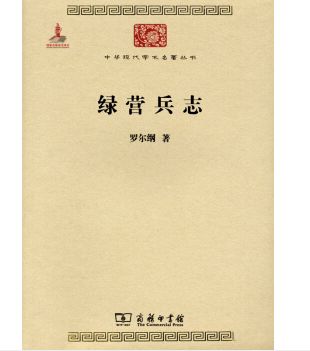There are 200 kinds of modern Chinese academic masterpieces
The 68th
"Green Camp Soldier Chronicle" is one of the works of the famous historian Luo Ergang to study the military system of the Qing Dynasty. With the theme of studying the origin and evolution of the state-owned Han army in the Qing Dynasty, that is, the Green Camp, and the organizational management system, this book analyzes in detail the organizational structure, command relationship, promotion and assessment system, and the management content of the Qing Dynasty Green Camp, such as the military branch. The book is divided into three volumes and fifteen chapters, with detailed green camp tabulation.

Identify the QR code one-click purchase ☟
Luo Ergang, born in 1901, is a native of Guixian County,Guangxi (now Guigang City). He is a famous historian, an expert in the history of the Taiping Heavenly Kingdom, a hermenist, a scholar of the late Qing Dynasty, and a first-class researcher of the Institute of Modern History of the Chinese Academy of Social Sciences.
Luo Ergang graduated from the Department of Chinese of the China Public University in Shanghai in 1930, and after graduation, he studied with The President Hu Shi. In 1932, he began to study the history of the Taiping Heavenly Kingdom by identifying false letters. Since then, he has successively engaged in research at the Institute of Liberal Arts of Peking University and the Institute of Social Studies of academia sinica, and has also served as a professor in the compilation of Guangxi Tongzhiguan and the Department of History of Central University. After the founding of the People's Republic of China, he served as a researcher at the Institute of Economics of the Chinese Academy of Sciences, transferred to the Institute of Modern History of the Chinese Academy of Social Sciences in 1954, and joined the Communist Party of China in 1958. He has successively served as a deputy to the Second and Third National People's Congresses, and a member of the Second and Fifth National Committee of the Chinese People's Political Consultative Conference. He died in Beijing on May 25, 1997.
He was mainly engaged in the study of the history of the Taiping Heavenly Kingdom and the history of the military system in the late Qing Dynasty, forming a unique academic style that was good at examining evidence; presided over the preparation of the Nanjing Taiping Heavenly Kingdom History Museum; created a new style of general history of "synthesis"; and successfully applied materialistic dialectics to the study of evidence, thus reforming the method of historical research. In his lifetime, he published about 50 academic monographs, published more than 400 papers, a total of more than 9 million words, and collected, sorted, compiled and published 30 million words of Documents and Materials of the Taiping Heavenly Kingdom.
Mr. Luo's "Chronicle of the Green Camp Soldiers" consists of fifteen chapters, the main contents of which mainly include: The History of the Green Camp: Chapter 1 Why the Qing Dynasty Established the Green Camp System; Chapter 2 The Origin of the System; Chapter 3 The History of the Establishment; Chapter 4 The Decline of the Green Camp; The Middle Volume The Green Camp System: Chapter 5 The Barracks System; Chapter 6 The Military System of the Indigenous Lineage; Chapter 7 The Command of the Green Camp; Chapter 8 The Tasks of Peacetime; Chapter 9 The Order of Dispatch and Attachment in Wartime; The Second Volume The Green Camp Military Administration: Chapter 10 Selection; Chapter 11 "Military Politics" and Brief Reading; Chapter 12 Discussion and Punishment Chapter 13 Salary; Chapter 14 Armament; Chapter 15 Ma Zheng.
Regarding Mr. Luo's academic style, her daughter Comrade Luo Wenqi has a concise summary, saying: "His research work not only reflects his attitude and method of governing studies, but also reflects his efforts to study Marxism-Leninism, constantly improve theoretical understanding, and constantly criticize and inherit the tradition of the motherland's historiography, thus forming his unique style." It is believed that his academic characteristics have the following four aspects: First, cutting through thorns and thorns, distinguishing between falsehood and seeking truth; Second, be good at independent thinking, dare to explore and innovate; Third, be humble and like a valley, from good as a stream; Fourth, study hard, persevere, and keep moving forward.
Mr. Luo once summed it up himself: "When I study the history of the Taiping Heavenly Kingdom, I first do the work of distinguishing falsifications and examining letters. To do this kind of work, you must be patient, careful, meticulous, you must break the sand pot pattern (ask) to the end. These habits should be said to be the basic skills of my life's work. ”
Mr. Luo's lifelong research on the history of the Taiping Heavenly Kingdom is like a rich academic treasure house, which "constitutes a complete system of historical research on the Taiping Heavenly Kingdom with its wide aspects, new meanings, many layers, and intertwined longitude and latitude." Although it is impossible to have everything in this treasure house, any scholar who is engaged in the study of the history of the Taiping Heavenly Kingdom always has to go to this treasure house to find what he wants before starting his own research. As some commentators have said, "No one who does not read Mr. Luo's book, no one who is not inspired by him, draws nourishment from his books." (Sushuangbi)"
Mr. Luo Ergang is recognized by the academic circles of China as the founder, founder and academic master of the historical research of the Taiping Heavenly Kingdom. The late Liu Danian, honorary director of the Institute of Modern History of the Chinese Academy of Social Sciences, called him the earliest historian of the Taiping Heavenly Kingdom in New China, and Mr. Wang Qingcheng believed that "Mr. Luo is the most outstanding person in China and even in the world in the study of the Taiping Heavenly Kingdom."